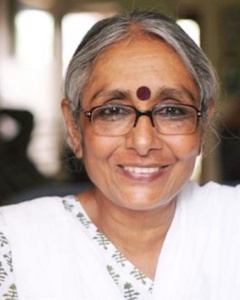The following article written by Siddarth Shankar appeared in the Feb. 26 issue of the Yale Daily News:
Though India may be the largest democracy in the world, its democratic norms and values are under threat, according to Indian social and political activist Aruna Roy who spoke to a crowd of approximately 50 at Luce Hall Monday evening.
The talk, “Democracy in the Era of Demagogues,” was hosted by the South Asian Studies Council. A founder of the nonpartisan, crowdfunded organization Mazdoor Kisan Shakti Sangathan, or “Workers and Peasants Strength Union” in English — Roy has dedicated her life to helping the poor, especially impoverished farmers. She also worked for the Indian government from 1968 to 1975. During her talk, Roy, who was among Time magazine’s “100 Most Influential People” in 2011, emphasized that the Indian Constitution was under threat from forces that wanted to diminish India’s “secular” and “socialist” nature.
“It’s very common knowledge that people in the ruling party want to change the constitution,” Roy said. “They want India to be a theocratic state. The system of democracy which we look to for protecting our fundamental rights has failed.”
A self-described “worker and activist for the grassroots,” Roy was the architect behind India’s Right to Information Act, which aimed to reduce corruption by requiring increased government transparency. Over 8 million people use the law every year to acquire information from the government, according to Roy.
Roy focused her talk on struggles within India, but she noted that the problems of demagoguery are also applicable to other countries, such as Hungary and even the United States.
According to Roy, the first step demagogues take is to centralize power. In India, a massive governmental identification scheme was rolled out, meant to encompass all aspects of a person’s life, including links to bank accounts and phone numbers. Roy opposed this scheme, citing doubts about the government’s handling of people’s sensitive information, but was ultimately unsuccessful in stopping its implementation.
The need for increased transparency in governance was a recurring theme in Roy’s remarks. She argued that “a class of elites owns India” and has made it susceptible to “marauding capitalism” that destroys communities and the environments around them. Since Indian political parties are able to acquire funding from undisclosed sources, Roy believes that making party finances public is the only way to stop corruption.
Most of all, Roy was concerned about the rise of fake news and how the younger generation has become easily susceptible to it. Roy personally recounted being disallowed from speaking at Indian universities because they did not want her to speak about the freedom of expression.
“In this complete inversion of democracy and values, we have to speak up,” she said. “If corporations and world leaders can get together to destroy democracy, then we must find space to be together and stop it.”
Attendees interviewed by the News responded positively to Roy’s talk, with many saying that Roy’s remarks were thought-provoking.
Sakshi Hallan GRD’ 19 noted that Roy brought to light “things that you couldn’t necessarily say in India.”
Others praised Roy for emphasizing the voices of the impoverished.
“She’s speaking for a lot of people who have no voice, and I think that’s brilliant,” said Ami Potter, who works with the Asian art collection at the Yale University Art Gallery. “What I really loved is that she talked about the space for civil society and what we can do.”
Roy is currently a fellow at Brown University.


